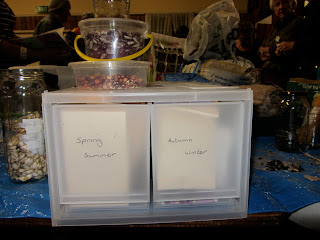The Importance of Seeds
Sharing seeds and local knowledge in our community
 |
| Our group of keen seed savers soaking up some advice from Anne Miller. |
 |
| Everlasting daisies to swap for other produce from members. |
This month we got together to share the essentials of seed raising and talk about the importance of seed saving in your garden. Members came prepared with seed raising mixes, pots, paddlepop sticks and of course seed to swap and share!
 |
| Some advice on seed raising mixes from Anne Gibson |
Elements you might have at hand in the garden to raise seeds in are sieved compost or worm castings, they are are best mixed with some vermiculite to ensure a light and well drained mix. Do not use soil from the garden, it can have many other seeds laying dormant in it, it has a tendency to dry out and is hard to re-wet and it may also have fungus or other disease spores that are not helpful to your new seeds.
Don't forget to wet these ingredients down before you use them or try and work up wind as the fine particles can be harmful to our respiratory systems.
Basic rules of seed raising:
- Use a sterile seed raising medium.
- Wet the medium once after planting the seed and leave until you see germination. If your mix is drying out, mist only with a fine spray.
- Situate them in a sheltered position with semi-shade and out of the wind. A recycled clear plastic lettuce or strawberry container is perfect and also keeps the mice out!
- Feed them with diluted seaweed solution only once the first two leaves have appeared.
- Prick out the smaller or weaker looking plants and transfer them to the garden when the first set of true leaves have appeared.
 |
| Swapping seed |
 |
| Anne Millers seed bank and bottles of seed with robust generational seed acclimatised to our local environment. |
 |
| All you need is some fine, light soil, a little water and a label! |
Be careful to store your seed away from the light and at a constant temperature, between 15-20 degrees is best. Some seeds can be stored in the fridge. And if you want to kill tiny pests that may be on your seed from your garden, freeze them for 3 days or so before you store them. Little zip lock bags are great to keep them moisture free and small envelopes to label and keep them dark are easy to come by.
Start off by getting good quality, organic, open pollinated, heirloom seeds from local gardeners at our seed savers group on the first Sunday of every month at 8am, Sweethearts Cafe Eudlo QLD 4554
or online at;
Green Harvest Organic Seeds
Diggers Club
Eden Seeds
Jankala Organic Seed
The Lost Seed
Let the best plants go to seed and carefully collect, store and label them for next year. Happy planting!
 |
Wonderful multi-coloured eggs to swap and share.Our next meeting is on November 6th from 7pm at the Edulo Town Hall, see you then! |

